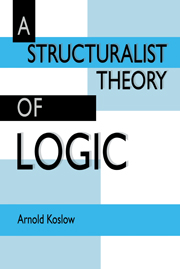Book contents
- Frontmatter
- Contents
- Preface
- Part I Background
- Part II Implication relations
- 5 The theory of implication relations
- 6 Implications: Variations and emendations
- 7 Familiar implication relations: Deducibility and logical consequence
- 8 Implication relations: Direct and derived
- 9 Implications from implications
- 10 Implication relations and the a priori: A further condition?
- Part III The logical operators
- Part IV The modal operators
- Appendix A An implication relation for the integers in the programming language BASIC
- Appendix B Symmetric sequents as products of implication relations and their duals
- Appendix C Component-style logical operators and relevance
- Notes
- Bibliography
- Index
10 - Implication relations and the a priori: A further condition?
Published online by Cambridge University Press: 05 May 2010
- Frontmatter
- Contents
- Preface
- Part I Background
- Part II Implication relations
- 5 The theory of implication relations
- 6 Implications: Variations and emendations
- 7 Familiar implication relations: Deducibility and logical consequence
- 8 Implication relations: Direct and derived
- 9 Implications from implications
- 10 Implication relations and the a priori: A further condition?
- Part III The logical operators
- Part IV The modal operators
- Appendix A An implication relation for the integers in the programming language BASIC
- Appendix B Symmetric sequents as products of implication relations and their duals
- Appendix C Component-style logical operators and relevance
- Notes
- Bibliography
- Index
Summary
The background theory against which the various logical operators are characterized requires that implications be relations on sets. These implication structures of the theory are at the heart of our account of the logical operators as well as the modal operators (Part IV). It is integral to our theory of the logical operators that any two implication relations that extend each other (are coextensional) will result in logical operators that are equivalent by either implication relation.
Recently, Peacocke (1981) has objected to the extensional treatment of deducibility relations in Hacking's account (1979) of the logical connectives. On Hacking's view, it makes no difference which of two coextensional deducibility relations is used to account for the logical connectives. Hacking's account is the target of Peacocke's objection, and the substance of the objection easily carries over to our own. In substance, Peacocke claims to have produced a case of two coextensional implication relations, such that conjunction relative to one is just the standard “&,” whereas conjunction with respect to the other is some nonstandard, partially defined connective.
Peacocke's remedy is this: Not all coextensional implication relations are on a par for a theory of the logical connectives. Instead of requiring that implication relations (he calls them “deducibility relations”) satisfy the conditions of Reflexivity, Dilution, and Transitivity, he requires instead that it is a priori that the relation satisfies those conditions (Peacocke, 1976, 1981).
- Type
- Chapter
- Information
- A Structuralist Theory of Logic , pp. 70 - 74Publisher: Cambridge University PressPrint publication year: 1992



